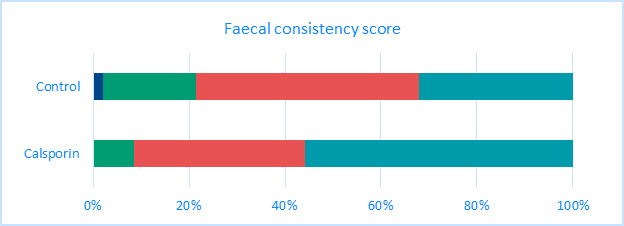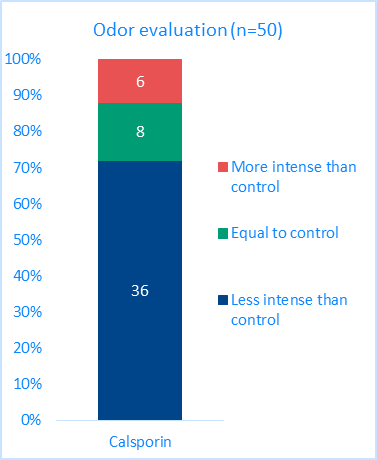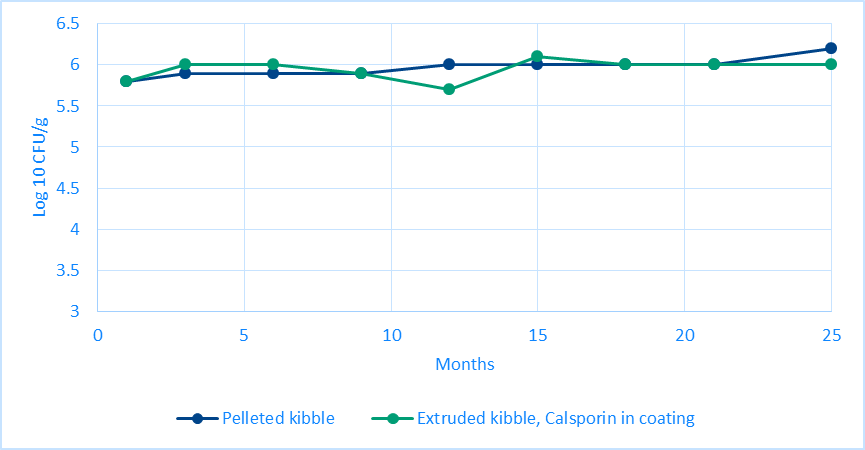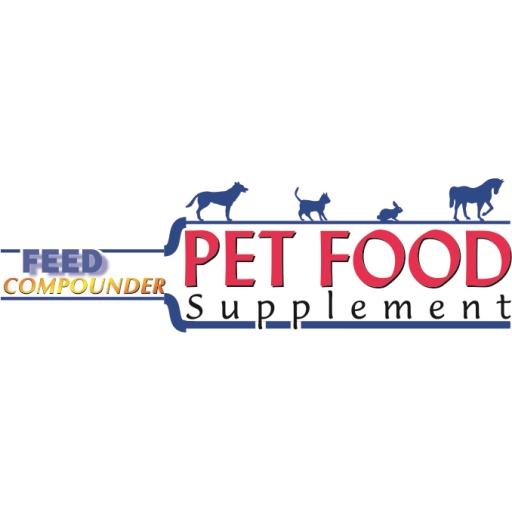Keep the Probiotic Alive
By Pauline Rovers-Paap, Orffa Additives
Probiotics are live micro-organisms which, when administered in adequate amounts, confer a health benefit to the animal. Probiotics support the development of a healthy microbiota in the digestive tract of the dog. As a result, probiotics have a beneficial effect on the health and well-being of the dog and improve various faecal characteristics. To provide pets with adequate amounts of the probiotic, it is not enough to only incorporate a minimum level of the probiotic during production of a pet food, treat or supplement. This implies that the probiotic would survive the production process and the long shelf-life expected of pet products. Additionally, the probiotic must stay alive in the complete gastro-intestinal tract of the animal.
Spore-forming probiotics have the major advantage of being highly stable. The spore is a natural protecting shield of the micro-organism itself. This makes spore-forming probiotics less sensitive to the acidic gastric fluid and the harsh conditions during the pet food manufacturing processes. Also, they are better able to maintain their viability in pet products over a long shelf-life.

Probiotic health benefit
Health and well-being of the dog is closely related to a healthy and stable microbiota in the digestive tract. The microbiota is a large community of living microbes in the intestinal tract of animals. This microbiota has a symbiotic relationship with the host and supports in the digestion of food, plays an important role in the immune function and helps to protect the animal against infections. Disturbance of the microbiota can lead to discomfort for both dog and owner. The consistency of the faeces can become too watery (diarrhea) or too hard (constipation) and can be accompanied by a strong unpleasant smell. Promoting the development of beneficial bacteria and increasing microbial diversity, supports a normal and stable microbiota, thereby supporting the health and well-being of the dog (Figure 1).
Figure 1: A normal and stable microbiota support dog health and well-being

Calsporin®, the EU registered probiotic for use in dog food, contains the specifically selected strain Bacillus subtilis C-3102. This spore-forming probiotic has been proven to stabilize the gut microbiota in dogs. Providing Calsporin® to dogs results in an enriched microbiota and increased microbial diversity1. Higher microbial diversity is an important gut health parameter, as it makes the microbiota less susceptible for gut disorders. A greater abundance of the commonly accepted beneficial microbial groups Bacteroides, Faecalibacterium and Allobaculum increased in dogs fed with Calsporin® (1).
Supporting a healthy and more stable microbiota is often characterised by improved digestion of the food. Addition of Bacillus subtilis C-3102 to a pet diet significantly improved the apparent digestibility of ether extract and nitrogen-free extract in a study in dogs. Digestibility of dry matter and organic matter tended to improve and observations reveal positive effects on crude fibre and crude protein digestibility (2).
As a result of a stable gut microbiota and optimized digestion, Calsporin® improves faecal consistency of dogs and results in more well-formed stools. Droppings are more consistent and easier to pick up (1, 2, 3) (Figure 2). Odorous components, like ammonia and branched chain fatty acids, are significantly lower in the faeces of dogs receiving the probiotic in their diet (1, 2, 3). A panel of volunteers confirmed that the stool of dogs fed with Calsporin® had a less intense odour compared with the faeces of dogs receiving the same diet without Calsporin® 1 (Figure 3). A lower production of these odorous components is not only pleasant for the dog owner but the lower production of harmful gasses also benefits the intestinal health of the dog.
Figure 2: Calsporin® increases the rate of well-formed stools
(p < 0.05)


The improvement in faecal consistency is also beneficial for dogs with chronic incidences of diarrhea. In a field-study, dogs with more severe diarrhea at the start of the trial, showed the best improvements on faecal consistency during the trial period when receiving Bacillus subtilis C-3102 in a supplement. The probiotic also positively influenced the coat condition, resulting in a more shiny and bright coat in the Calsporin® treated group (4).
Figure 3: Less intense faecal odour by using Calsporin® in petfood (p < 0.05)

Gastro-intestinal tract survivors
For a probiotic effect in the animal, the live micro-organism should survive the complete gastro-intestinal tract. Some discussions for example exist about the survival of lactic acid producing species, used in human nutrition, in the stomach environment. In vitro tests, simulating the stomach and small intestinal environment, confirm the resistance of Bacillus subtilis C-3102 to gastric acids and bile salts. Measuring colony forming units (CFU) in the faeces of dogs fed with Calsporin®, confirms the survival of Bacillus subtilis C-3102 over the complete digestive tract (Table 1). A colony can only be formed and counted in a laboratory, when a micro-organism is alive and able to grow.
Some questions arise about the viability of probiotics when dogs also receive an antibiotic treatment. Frequently, antibiotics are not only effective against the pathogenic bacterial species, they can also harm the beneficial microbial species. As a result, antibiotic use, can lower variation of microbes and after the antibiotic treatment the microbiota needs to stabilize without development of opportunistic pathogens. Use of a probiotic during or after an antibiotic treatment may be desirable, as a probiotic will help to stabilize the microbiota again by increasing microbial diversity and stimulating the growth of beneficial bacteria. However, if used simultaneously, the probiotic should not be killed by the antibiotic treatment.
Table 1: Addition of Calsporin to a diet increases the Bacilllus subtilis C-3102 counts in fresh dog faeces, confirming the survival of the probiotic in the digestive tract.

A spore-former is a viable solution for petfood
To be effective, the probiotics have to stay alive during the harsh manufacturing processes of food or supplements. Calsporin® is extensively tested in different types of feed and petfood products. The robust spore-forming probiotic is thermostable and resists temperatures up to 100℃. Appropriate for the application in pellets, treats and pressed tablets. This is in contrast to non-spore forming probiotics, which are already killed at lower temperatures.
The spores are more sensitive to extreme high temperatures in combination with rapid changes in pressure, which limits the applicability in the extrusion process. In order to overcome this limitation, application through different coating strategies have been examined and developed. Tested strategies included dry and liquid palatants, different types of fats and oils, and combinations of these topical applications. As a result it is shown that all different types of coatings are applicable for a homogeneous distribution of viable spores of Calsporin® (Figure 4). Cooperation with key manufacturers of palatability enhancers has resulted in direct to use commercial powder and liquid palatants with adequate, viable amounts of Calsporin®. Palatants are a straightforward application for the use of Calsporin® in the production process of extruded kibbles.
Figure 4. Topical solutions for homogenous application of Calsporin® on extruded kibbles

Losses of viability of probiotics can occur during the storage of feed, for example after opening of the package or with storage under more severe conditions with high temperatures and/ or high relative humidity. Findings underscore that the Bacillus subtilis C-3102 spores are highly stable for different applications and forms in which the product is stored. Calsporin® spores have proven to be stable and viable for more than 2 years (Figure 5).
Summary
A well-formulated dog diet containing the stable and viable Bacillus subtilis C-3102 supports a healthy and stable gut microbiota in dogs. This will not only benefit the well-being of the dog, firmer stools and lower faecal odour is also highly appreciated by dog owners. A challenge is to keep the probiotic alive in the gastro-intestinal tract and during the harsh production process and long shelf-life of petfood products. The spore-forming probiotic Calsporin® is a viable solution for multiple applications in dog food products!
Figure 5: Stability of Calsporin® in petfood during shelf-life

References
1. Lima, D.C. de, et al. Dietary supplementation with Bacillus subtilis C-3102 improves gut health indicators and fecal microbiota of dogs. Animal Feed Science and Technology. 270, 2020, 114672, p. 114672.
2. Schauf, S., Nakamura, N. and Castrillo, C. Effect of Calsporin (Bacillus subtilis C-3102) addition to the diet on faecal quality and nutrient digestibility in healthy adult dogs. Journal of Applied Animal Nutrition. 2019, Vol. 7, e3.
3. Felix, A.D., et al. Digestibility and fecal characteristics of dogs fed with Bacillus subtilis in diet. Ciencia Rural, Santa Maria. v40, n 10, p 2169-2173, 2010.
4. Paap, P.M., et al. Administration of Bacillus subtilis C-3102 (Calsporin) may improve feces consistency in dogs with chronic diarrhea. Res. Opin. Anim. Vet. Sci. 6 (8): 256-260, 2016.
Other Topics
Contact
Phone
01994 240002
Address
Plas y Coed, Velfrey Road, Whitland SA34 0RA
